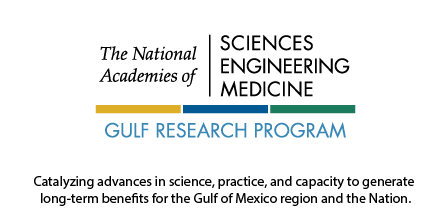
WASHINGTON – The Gulf Research Program (GRP) of the National Academies of Sciences, Engineering, and Medicine today announced a new funding opportunity to provide up to $2.5 million in grants to foster innovative approaches that support its ongoing efforts to improve understanding and prediction of the Gulf of Mexico Loop Current System (LCS).
“The Loop Current influences all Gulf of Mexico ocean processes as well as many other human and natural systems and processes, including hurricane intensity, offshore safety, and the Gulf food chain,” said Karina Khazmutdinova, associate program officer for the GRP. “Unfortunately, our understanding and ability to predict the Loop Current’s behavior is very limited.”
Last year a National Academies report, Understanding and Predicting the Gulf of Mexico Loop Current: Critical Gaps and Recommendations, identified existing knowledge gaps and long-term research needs to improve understanding and prediction of the LCS. In response to the report, the GRP held a funding competition and awarded $10.3 million in grants for projects to conduct a series of data collection, analysis, and modeling activities, which would inform the longer-term research prescribed. This new funding opportunity aims to supplement these efforts through support for related innovations that could result in improved cost-effectiveness, accuracy, or efficiency for observing and modeling the LCS.
“Part of the reason understanding of the Loop Current remains limited is that studying it is a costly and complicated endeavor. With this second funding opportunity, we’re seeking to address some of these challenges by supporting the development or testing of innovative theories, technologies, or methodologies that could expand the knowledge base or make improvements in the tools available for studying the Loop Current,” said Khazmutdinova.
Applications responding to this funding opportunity are due June 5, 2019, by 5 p.m. ET. Awards will be announced in late 2019 for projects lasting up to 18 months.
For more information, visit www.nationalacademies.org/gulf/grants.
The National Academies’ Gulf Research Program is an independent, science-based program founded in 2013 as part of legal settlements with the companies involved in the 2010 Deepwater Horizon disaster. It seeks to enhance offshore energy system safety and protect human health and the environment by catalyzing advances in science, practice, and capacity to generate long-term benefits for the Gulf of Mexico region and the nation. The program has $500 million for use over 30 years to fund grants, fellowships, and other activities in the areas of research and development, education and training, and monitoring and synthesis. Visit www.nationalacademies.org/gulf to learn more.
The National Academies of Sciences, Engineering, and Medicine are private, nonprofit institutions that provide independent, objective analysis and advice to the nation to solve complex problems and inform public policy decisions related to science, technology, and medicine. The Academies operate under an 1863 congressional charter to the National Academy of Sciences, signed by President Lincoln.
Tomado de: The National Academies


Recent Comments